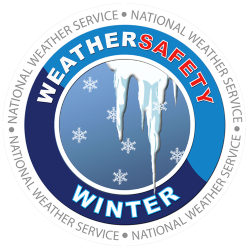Winter Weather Safety
Published Date: Jan 05
 image by the National Weather Service
image by the National Weather Service
Now is the time to prepare for the hazards of winter weather before bitter cold and snowy/icy travel conditions sweep through.
The NWS's Winter Safety website is a great resource for winter safety information.
The Birmingham NWS Winter Weather Awareness site has additional information.
 image by the National Weather Service
image by the National Weather ServiceNow is the time to prepare for the hazards of winter weather before bitter cold and snowy/icy travel conditions sweep through.
The NWS's Winter Safety website is a great resource for winter safety information.
The Birmingham NWS Winter Weather Awareness site has additional information.
Compressed Gases and Cryogenics in Research Labs
Published Date: Aug 31
Management of compressed gas cylinders is very dangerous because of the unusual characteristics some of them posses: storage under pressure, flammability, and many lack a distinguishable odor or color. Depending on the particular gas, there is a potential for simultaneous exposure to both physical and chemical hazards.
Improper handling, storage and use could lead to catastrophic events like:
Improper handling, storage and use could lead to catastrophic events like:
- Oxygen depleted atmosphere
- Fires
- Adverse health effects or even death
Seasonal Influenza
Published Date: Aug 30
What is Influenza (also called Flu)?
The flu is a contagious respiratory illness caused by influenza viruses that infect the nose, throat, and lungs. It can cause mild to severe illness, and at times can lead to death. The best way to prevent the flu is by getting a flu vaccine each year.
Signs and Symptoms of Flu
People who have the flu often feel some or all of these signs and symptoms:
Read more
The flu is a contagious respiratory illness caused by influenza viruses that infect the nose, throat, and lungs. It can cause mild to severe illness, and at times can lead to death. The best way to prevent the flu is by getting a flu vaccine each year.
Signs and Symptoms of Flu
People who have the flu often feel some or all of these signs and symptoms:
- Fever* or feeling feverish/chills
- Cough
- Sore throat
- Runny or stuffy nose
- Muscle or body aches
- Headaches
- Fatigue (very tired)
- Some people may have vomiting and diarrhea, though this is more common in children than adults.
Read more
